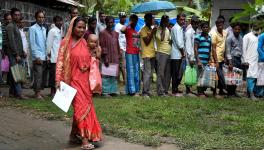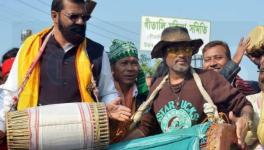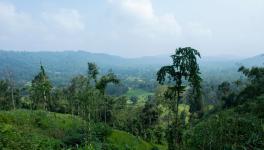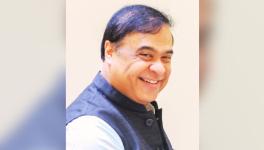Assam: BJP on Defensive Amid Massive Protest Against Citizenship Bill
Image for representational use only; Image Courtesy : NDTV
For the past two weeks, Assam has been simmering with tension over the contentious Citizenship (Amendment) Bill 2016 (CAB) that has put the Bharatiya Janata Party (BJP)-led Assam government on the backfoot, while its defensive strategies are also apparently failing one after another. BJP’s trump card of inciting communalism also seems to be failing in Assam, as leader of the Krishak Mukti Sangram Samiti (KMSS) Akhil Gogoi's jibes against the BJP are falling heavy on the face of the ruling party and its flag bearer minister Himanta Biswa Sarma, who quit Congress to join BJP right before the 2014 Assembly polls amid allegations of massive corruption. Now, Sarma holds multiple ministries in the BJP-ruled Assam government, including Finance and Health.
Akhil Gogoi: No Objection If Bangladeshi Hindus Stay for Limited Time
After the successful Northeast shutdown on January 8, on the eve of the Assamese festival Bihu, Gogoi, a peasant leader and advisor to the popular Assamese outfit Krishak Mukti Sangram Samiti (KMSS), staged a 24-hour-long hunger strike in Guwahati on January 15-16 to oppose the Bill that grants citizenship to Hindu Bangladeshis — among other immigrants. Several other organisations and leaders as well as media personalities, such as Nitumoni Saikia and Ajit Kumar Bhuyan, also joined Gogoi in the hunger strike and took an oath to safeguard the secular fabric of the state and the nation by joining hands.
When questioned if their protest was against Bengalis, particularly Bengali Hindus, Gogoi said, "I am saying with all humility that neither the KMSS nor the 70 community organisations have ever been against Bengali-speaking people. We are protesting against the infiltrators — irrespective of them being Bengalis Hindus or Muslims — who have come to Assam after 1971, specifically those who have come here after March 24, 1971. In today’s date, it is not possible for any nation to encourage perpetual migration or infiltration or accept new people from abroad for indefinite time. We have limited land and space and our economic condition is bad, so we cannot accept people coming from other nations (to live here). It is only because of this, the 70 community organisations and KMSS are saying that only the foreigners should go back (to their own countries). We are not against the Bengali citizens already living here, the Bengali-speaking folks — the Hindu and Muslim Bengali citizens. We are not speaking against any of these people (legitimate Bengali citizens). We are democratic people, we want to stay together with solidarity and unity. We are only against the foreigners, the infiltrators who came after 1971.”
On the state-wide protests against the Bill, Gogoi said, "The Bill will hamper the secular character of India. The Indian Constitution says we are a secular nation, and there is no provision for religion-based citizenship here. However, the BJP and RSS, with their fundamentalist and communal ideology, are trying to give citizenship on the basis of religion for the first time in India. We are opposing the Bill simply to save the essence of the Indian Constitution.
Second, if the Bill gets passed, the Bangladeshis, who came to Assam after 1971, will get the citizenship status. If they are given citizenship, it will be like giving citizenship to foreigners, and that’s why we are opposing the Bill. Third, if the Bill gets approval, then the one crore 70 lakh Bangladeshi Hindus who are living there as per record of the Bangladesh Bureau of Statistics published in 2015, will be able to come to India as well as Assam. We are opposing that possible influx of people from Bangladesh; otherwise, we would not have opposed the Bill. If people are persecuted for their religion in Bangladesh and come here to seek refuge, we don’t have any objection in accepting them as refugees for a limited period.”
Suggesting a solution to the alleged influx of Hindu Bangladeshis owing to religious persecution, Gogoi said, "If Hindus are persecuted in Bangladesh, the Indian government should rather exert pressure on the Bangladesh government to ensure the safety of those Hindus. But bringing people from anywhere in the globe to India cannot be accepted by us as modern democratic individuals."
Himanta Alleges Muslim Infiltration; BJP Shown Black Flags
On January 16, as Gogoi and others took a vow to stop the alleged influx of Bangladeshi Hindus, Assam’s heavyweight BJP leader Himanta Biswa Sarma, said in a TV interview with Assamese news channel DY365 — that a Satra (Vaishnavite prayer centre) at Moinbari near Kalgachiya in Barpeta district, had to be shifted to Sarbhog owing to the "aggressive behaviour" of Bangladeshi Muslims. Sarma's communal card, however, fell flat as the next day, hundreds of Muslim and Hindus from the area filed an FIR against Sarma for his “provocative” statement.
Octogenarian Communist Party of India (Marxist) leader Hemen Das also refuted Sarma’s claim, saying it was not Muslims who captured the Moinbari Satra but the Brahmaputra river itself. Incidentally, the prayer centre had to be shifted to Sarbhog in 2005 owing to the erosion of the banks of Brahmaputra. Many, including the Satra chieftain Ganesh Chandra Adhikari's son, Apurba Adhikari, had vividly described an article published in a local magazine called Chetana, how Muslim Bengalis had actually saved the Satra from invaders during the 1980s’ Assam Agitation. Another Assamese portal-cum-daily, Gana Adhikar, also published a report where the Satra chieftain's younger brother, Ranajit Adhikari, had said that there were no Bangladeshis there and challenged Sarma to visit the Moinbari area to see the truth himself.
Sarma had also recently said on multiple occasions that 17 constituencies in Assam would go to the "successors of Muhammad Ali Jinnah" if the alleged Muslim infiltrators were allowed in the state and Hindus were not given shelter by passing the Bill. On January 4, while Prime Minister Narendra Modi unofficially kicked off the campaign for the Lok Sabha polls in Barak Valley's Ramnagar, Sarma said, "Congress wants Jinnah to remain in India, but not Bengali Hindus. Hindus can never be foreigners in India." The BJP flagbearer minister reiterated the same stance in his January 16 TV interview, too.
The day after his TV interview, Gogoi challenged Sarma in a press conference in the presence of veteran Assamese poet-literary critic Hiren Gohain, against whom recently an FIR was filed on 'sedition' charges, saying he knew Sarma since his days as a student at the prestigious Cotton College of Guwahati and that Sarma allegedly “ran a racket of illegally manipulating the admission process" at the college. Gogoi termed Sarma a dalal— a crook. He lambasted Sarma on the latter's comment during the Silchar rally of PM Modi. "Himanta said in Silchar that the Citizenship (Amendment) has been brought for all Hindus across national boundaries, but in Guwhati, he changed the stand on his own TV channel, declaring that ‘it was because of the Assam Accord that the Bill has been brought," added Gogoi.
Apart from Gogoi lambasting Sarma, on the same day, on the arrival of Assam Chief Minister Sarbananda Sonowal during a programme at Darrang district's Mangaldoi town to celebrate Silpi Divas (Artist’s Day — birthday commemoration of eminent Assamese artist Jyoti Prasad Agarwala), a 70-year-old man, Haren Deka, protested against BJP's stand on the Bill by shedding off his clothes, as reported by leading Assamese daily,Asomiya Pratidin,on January 18.
KMSS and some other organisations also reportedly showed Sonowal black flags, shouting slogans such as "Sonowal Murdabad, BJP Murdabad". Sonowal was shown black flags by several student organisations at Jorhat district's Kaziranga University, too. In another incident, BJP's state president Ranjit Kumar Das was also reportedly greeted by black flags on the National Highway 37 at Numaligarh. Das reportedly had “gone to Kumargaon to campaign for the upcoming Sonowal Kachari Autonomous Council elections." On the same day, BJP's Lakhimpur MP Pradhan Baruah was literally hounded by the anti-Bill crowd, who "attached a black flag to the vehicles" of his convoy.
The Link Anti-Bill Protests and BJP's Defensive Stance
Drawing a connection between the state-wide protests against the ruling BJP in a single week, Bonojit Hussain, a prominent Assamese activist-cum-scholar associated with the New Socialist Initiative (NSI), said, "Last night, Himanta gave that interview in DY365, and this afternoon, Akhil did a press conference. Hiren Gohain sir also did a press conference today, and they have called out the lies of Himanta. It's all connected. A while ago, he had written a Facebook post saying that, 'Oh, these are all Naxals'. His tweet today was a response to the press conferences today. His interview was a response to the crisis that is happening. I mean all these black-flag protests and nude protest, and everything that is happening, he is trying to do damage control. Have you seen Himanta Biswa Sarma giving interview to any other channel before? He always gives interview to his own channel. Now what has forced Himanta Biswa Sarma to give interview in another channel! Because they are defensive. They don’t know what to do, as the people of Brahmaputra valley are angry. Wherever the CM goes, black flag is shown, people take off their clothes. So, they are completely on the back foot."
The Kakopathar Incident
However, as the anti-Bill protests have put the ruling BJP on the defensive, and although Gogoi said he did not have any issues against Bengali citizens, the anti-Bengali agitation in the garb of anti-Bangladeshi protests, is also going on unabated.
The Asomiya Pratidin reported on January 13, that in the Kakopathar town of Tinsukia district, a group of 36 people — including women and 18 children — had been harassed by anti-Bill protesters on January 12. Some of the protesters reportedly even tried to set ablaze the belongings of the travellers, shouting "Bangladeshi, Bangladeshi". The police took control of the situation, but instead of nabbing the miscreants, the cops reportedly took the travellers in custody. However, those arrested said they were not Bangladeshis but residents of Nagaon and Morigaon districts of central Assam and were on their way to Arunachal Pradesh.
There has been a surge of such anti-Bengali incidents in the Brahmaputra valley since the anti-Bill protests have gathered momentum. A report published on The National Herald blamed Gogoi for kick-starting the harassment of Bengali-speaking people. Gogoi, however, busy in his tussle with Sarma, is yet to condemn any of these incidents, particularly the Kakopathar incident.
In this backdrop, the big question that remains hanging in balance is while the anti-Bill protests might have put the ruling BJP in trouble, can leaders such as Gogoi actually handle the situation on the ground that makes the entire Bengali-speaking population of the Brahmaputra valley also an enemy of the state? The question remains whether Akhil Gogoi and other Assamese leadership, can rein in the popular Assamese sentiment against Bengali citizens, or tagging anyone as Bangladeshi, merely on the basis of suspicion?
The writer is and independent content management consultant based in Assam.
Get the latest reports & analysis with people's perspective on Protests, movements & deep analytical videos, discussions of the current affairs in your Telegram app. Subscribe to NewsClick's Telegram channel & get Real-Time updates on stories, as they get published on our website.
























